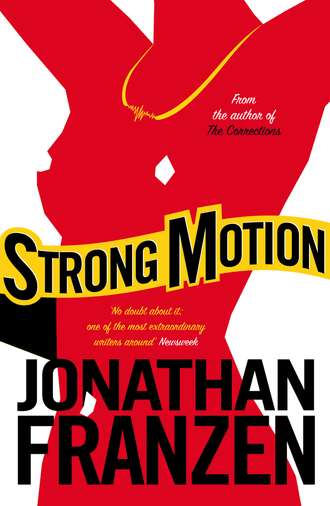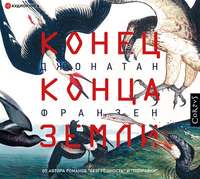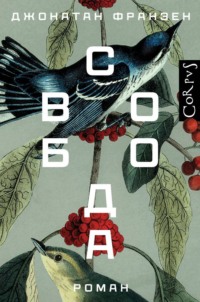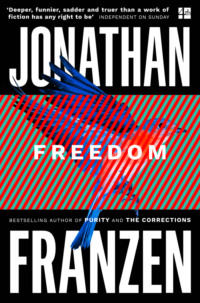
Полная версия
Strong Motion
Peter was standing slightly apart from a group of three uneasylooking men in nice suits, three obvious executives or professionals. With his legs spread and his shoulders thrown back and his hands shallowly in his pockets, he looked like a person to whom the world may come if it really must. Eileen, colliding with him, pressed her ear against one of his houndstooth lapels and rested one hand on his stomach, the other on his shoulder.
Louis stopped in his tracks and stared at the embrace with his hands on his hips. Then, altering his trajectory as though a repulsive field now surrounded Eileen, he caught up with Bob and the two of them shuffled after Melanie, whose approach was causing the three gentlemen in suits to break into smiles of relief. She brushed cheeks with two of them, shook hands with the third. Peter freed himself from Eileen and came over to Melanie with his arm outstretched, but suddenly she was keeping her hands to herself. She smiled glacially. “Hello Peter.” Bob Holland, like a grateful second-stringer, claimed the unshaken hand and pumped it, but Melanie’s snub had not escaped Eileen’s attention; she glowered at Louis. Louis smiled back pleasantly. He was interested to see that at some point during the week his parents had made Peter’s acquaintance.
“This is our son, Louis,” Melanie said. “Louis, this is Mr. Aldren, Mr. Tabscott, Mr. Stoorhuys—”
Mr. Who, Mr. Who, Mr.—?
“Good to know you, Louis,” they chorused, pressing his flesh. The same courtesies were then extended to Eileen.
“Peter’s dad,” Mr. Stoorhuys added for Louis’s benefit, waving a hand at his son, to whom he bore a resemblance both unmistakable and unflattering to himself. Seen from close up, Mr. Stoorhuys did not actually match his two companions. Mr. Aldren and Mr. Tabscott appeared to be real Men, men with the beefy faces and inflamed-looking bull’s nostrils of frequent beefeaters, men who were emphatically not “young men” and even more emphatically not “women.” They had gold chains across their necktie knots and a hard red shrewdness in their eyes.
Mr. Stoorhuys was more nervous and lanky. Three inches of shirt cuff stuck out of his jacket sleeves on either wrist. His hair grew in half a dozen directions and half a dozen shades of gray; a long, seventies-style forelock rested on his dandruffy eyebrows. He had sunken pitted cheeks, teeth so large he seemed unable to keep his hps over them, and bright intelligent eyes that were engaged in looking over his shoulder even as he stood facing Louis, one hand raised to keep him on hold.
“Louis,” Melanie said. He turned to see her standing on one leg, leaning through bodies. “Maybe you’d like to get me a cup of coffee.”
“Actually—” Mr. Tabscott pinched the cuff of Louis’s jacket. “I think the, uh, service is going to start here in a minute.”
“Yes,” Mr. Aldren said. “We’re going to sit with your mother if you don’t mind.”
“Good to meet you, son.”
“Good to meet you, uh. Louis.”
Mr. Stoorhuys followed them, escaping his stillborn conversation with Louis the easy way: by just leaving.
The drab crowd was herding itself towards rows of function-room chairs set up facing a lectern and a grand piano on which a Japanese man with expressive shoulders and a ponytail had begun to play the Pachelbel Canon. Louis’s father, with his academic’s respect for lecterns, had already taken a seat. Eileen stood hugging Peter’s chest. And a tableau presented itself: Mr. Aldren leading Melanie away, his elbow linked with hers, and Melanie not needing to be led but walking with him as naturally as if they were sweethearts on a boardwalk; Mr. Stoorhuys following with a grip on her other arm, smiling his smile that was not a smile, lagging behind for a moment to look over his shoulder through the rough tufts of hair in his eyes; and Mr. Tabscott like a rear guard with his back squarely to the three of them, unambiguously warning off anyone foolish enough to pursue. A white hat and a yellow linen dress— a lady as little a man as at least two of these men were ladies— fenced in by dark pinstripe.
Louis, staring, extended one finger and rammed the tip of it into the bridge of his glasses.
The Canon had grown deafening. Melanie sat down between Mr. Aldren and Mr. Tabscott with Mr. Stoorhuys crowding in from Mr. Aldren’s side, his thin arm almost long enough to reach behind all three of them, five inches of white shirt cuff showing now. Louis roughed up the pastel broadloom with a heavy shoe. Asking Eileen who and what these men were was not an option; she had her cheek against Peter’s necktie and was feeling around under the back of his jacket as if looking for the key one wound him up with. Their lips were moving: they were conversing inaudibly. They and Louis were now the only mourners not seated in the array of chairs. An ashen-faced woman in a caftan had stationed herself behind the lectern and was resting one elbow on it as she gravely watched the pianist. The pianist had begun to grapple visibly with the Canon, trying to enforce a ritardando while hurrying the ponderous chords to find a respectable point for breaking off. The Canon was showing its backbone and seemed far from surrendering.
Louis walked over to the young lovers in their invisible sphere of oblivion and stood, as it were, outside their door. “Hi, Peter,” he said.
Peter seemed to have a reflex problem. It was three or four seconds before he turned and said, “Hey, how’s it going.”
“Fine, thanks. Wonder if I could talk to my sister for a second.”
Eileen removed herself from Peter and gave some attention to her hair. By almost but not quite meeting Louis’s eyes she managed to appear entirely absent.
“I didn’t do anything to you,” Louis said.
“Didn’t say you did.”
“Mom give you a hard time or what.”
“Let’s just not talk about it.”
“Yeah. Well.”
“I’m going to go sit with Peter, OK?”
She left him standing in the middle of the ballroom, ten paces behind the last row of chairs. The lights shone more brightly on him than on the fifty or so assembled mourners, more brightly even than on the ashen moderator, who, after a nod of appreciation to the sweating and victorious pianist, looked squarely at Louis and said, “We may be seated.”
Louis held his ground, arms crossed. The woman closed her eyes with raised eyebrows. Then she put on a pair of glasses that were chained to her neck.
“We’re assembled here today,” she said, reading from the lectern, “to honor the memory of Rita Damiano Kernaghan, a mentor unto many of us and a friend unto all. Can you hear me in the back row?”
The only person in the back row, Bob Holland, gave the woman a captain’s salute.
“My name is Geraldine Briggs. I was a friend of Rita Kernaghan. I knew her well. At times, we were as sisters unto one another. We laughed together, we wept together. We were as little girls, sometimes.”
The pallid mourners were listening raptly, their heads like so many compass needles pointing at the lectern. The men with Melanie, Mr. Stoorhuys included, sat with their fingers pressed into their foreheads.
“When first I met Rita at the Empowerment Center in Danvers in 1983, she had just penned a book entitled Beginning Life at 60, familiar to many of you, I’m sure, and seemed, she did, a perfect embodiment of the principles limned therein. Rita had learned that the soul is eternal and youthful, gay and joyous, filled with glad melodies. Age is no impediment unto the soul. Nay, death itself be no impediment. She had been a simple peasant girl, a gatherer of flowers and scented herbs, in Napoleonic times. Why should she not then make glad melodies even now when, a careworn widow, there was nought to be wrought of life but, nay, begin it again? Why should not we all? In her workshop, we hearkened unto her message. We learned. We grew. We laughed. We became as young again. We were healed, healed not as the modern world would have us healed, but spiritually. Nay. A new world was opened up unto us by her.”
Louis, standing rocklike, watched Mr. Tabscott bury his face in both hands. His jeweled watch gleamed.
“But nay. what is the new but that which is most ancient? And what. What is death but the beginning of new life? Another turn in the eternal cycle? A young babe born? Let us therefore tell glad stories today. Each one of us as so desires, let them stand and celebrate with glad stories the eternal life of Rita Damiano Kernaghan and, nay, of us all!”
Here Geraldine Briggs paused and a woman in the front row popped up from her seat. She immediately sat down again, withered by a look.
“I see among us,” Geraldine Briggs continued, reading, “friends of Rita’s. Family of Rita’s. Friends from her years of labor as a secretary. Friends and loved ones from all walks of her life. And so, friends, the Empowerment Center, which I’m proud to direct, has in accordance with Rita’s express wishes requested that in lieu of flowers donations be made in Rita’s name to the Empowerment Center. The name of the fund is the Rita Damiano Kernaghan Fund. This is fund number 1145. Envelopes for giving are still available by the coffee urn. But nay, nay, let us now. Let us now hear glad stories!”
The first glad story was delivered by Mr. Aldren, who rose halfway from his seat and spoke in a guarded monotone. “Rita Kernaghan was an employee with us at Sweeting-Aldren Industries for some twenty-four years and was the, uh, wife of the principal architect of what is known to be one of the Commonwealth’s hightech and high-finance success stories of the, uh, last couple decades, and I and some fellow officers are here to, uh, pay our respects. She was a fine—fine woman.”
Mr. Aldren dropped back into his seat and Geraldine Briggs, eyes closed, slowly nodded. Then the eager woman in the front row popped up and faced the congregation. Once, she said, after a class at the Empowerment Center, Rita Kernaghan had given her a bronze amulet to wear on her neck. The amulet had cured a large wen that was on her chest. Out of gratitude the woman had sent Rita a box of Harry and David’s pears. Six months later, at a festival of the vernal equinox held at Rita’s estate, the woman was taken into Rita’s living room. For six months the box of Harry and David’s pears had been stored close to the focus of power of the Pyramid on Rita’s house. Rita and the woman pried the staples—the staples were copper and heavy-duty—pried the staples out of the box. The pears were not rotten. The woman and Rita shared a pear, trading bites. It was good. The woman sat down.
Geraldine Briggs smiled uncomfortably and coughed a little.
A man with dentures like carp teeth stood up and unfolded a clipping. It was an editorial from the Ipswich Chronicle. The editorial was a thanksgiving that explicitly invoked the Judeo-Christian god and thanked him that property damage in the recent earthquake had been minor. The editorial noted that Rita’s famous Pyramid, so much in the news in recent years, had not protected her when push came to shove; damage on the Kernaghan estate (still slight) had been among the most severe. The man folded up the clipping. He said that he had taken two of Rita’s workshops. He said Rita had never maintained that the Pyramid offered eternal life in the present existence. That was not the point. It was this man’s personal view that the Pyramid had in fact served to concentrate the earth forces in the neighborhood—
“Yes,” said Geraldine Briggs. “Yes perhaps. Other stories?”
A woman rose to describe an occasion on which Rita had cried upon hearing of the death of a young person.
Another woman rose and told of Rita’s refusal to accept money from a person ill able to afford a workshop.
Another woman rose and spoke of her friendship with Rita during the Ming Dynasty.
It was not clear what sort of story besides Mr. Aldren’s would have pleased Geraldine Briggs; certainly few of these stories did. But having opened the door, she was powerless to close it. The anecdotes poured out, ranging from the sentimental to the borderline insane, and their accreting weight slowly unmanned Louis, uncrossing his arms and bowing his shoulders, until finally he went and sat down by his father. His father seemed to be having a grand time, tossing his head back in delight, feasting on the dismal confessions as though they were popcorn. He went so far as to frown at Geraldine Briggs when, for the third time, she said, “Well, if there are no more …” She paused. It finally seemed as if there really might be no more. “If there are no more stories I think we’ll—” But yet again she was forced to stop, because Melanie had sprung to her feet.
Melanie smiled prettily, twisting her head around to meet as many eyes as possible, leaning back to catch a few more. The only ones she avoided were her family’s.
“I knew Rita Kernaghan, too,” she said. “And I wanted to tell you all that I firmly believe she’s already reincarnated! I believe she’s now … a parakeet! Isn’t that marvelous?” She clasped her hands in front of her and swung them like a happy girl. “I just wanted to tell you all how marvelous I think it is that she’s a parakeet now, how simply marvelous. That’s all I have to say!”
With an unfortunate little wiggle of her bottom, and with one hand on her hat to keep it on, she dropped back down between her protectors, Mr. Aldren and Mr. Tabscott. The protectors traded smirks. The drab crowd, with dawning outrage, turned to Geraldine Briggs for guidance, but she appeared to have something urgent to say to the pianist. Eileen and Peter were whispering and nodding, maturely pretending not to have particularly noticed what Melanie said. The crowd began to murmur: Honor the dead! Honor the dead!
Louis was looking at his father, who in turn was looking at his wife. Once the surprise had faded there was nothing amused or affectionate or even angry in Bob’s expression. It was pure disappointed disapproval. And, as such, an expression that only love could sponsor. He would have looked exacdy the same if Melanie had said, “I’m being unfaithful. That’s all I have to say!”
The pianist had struck up a New Age melody, cosmic and burbling. “PEOPLE!” Geraldine Briggs shouted. “People, people, people. We have now heard BOTH sides, the glad and the unenlightened. So let us now go forth into the world with GLADDENED HEARTS AND SOBERED MINDS. REMEMBER THE ENVELOPES. AMEN!”
The drab men and women rose. As they headed for the refreshments they slowed and walked in half circles around Melanie like sullen, beaten hounds. She smiled and nodded to them all as she chatted with Messrs. Tabscott and Aldren and Stoorhuys, these favored hounds crowding around her. Soon Louis and his father were the only people still sitting.
“Sweeting-Aldren?” Louis said.
“Nature’s helpers. Herbicides, pigments, textiles.”
“Mom has something to do with them now?”
“You could put it that way.”
“She was so rude.”
“Don’t judge her, Lou. There’s no reason for you to trust me on this, but please don’t judge her. Will you do me that favor?”
Coquettish was the only word for the way in which Melanie was accepting an ordinary cup of coffee from Mr. Stoorhuys, pretending to be tempted against her better judgment. “I thought I was going to scream,” she went on to Mr. Aldren. For one brief moment, in the unblinking intentness of the smile Mr. Aldren had trained on her, the smiling wolf behind the smiling dog showed through, the cruel and hungry animal biding its time. He said, “You’re free for lunch, I assume.” To which Melanie replied, “I think I can squeeze you in.”
“Look at her.” Bob said. “Have you ever seen her so happy? You don’t know how long she’s had to wait. Hard to begrudge her a couple happy hours.”
“Yeah, although—”
Bob looked straight ahead at the empty lectern. “I’m asking you not to judge her.”
3
From the memorial service Louis drove his father to a cheap hamburger restaurant in Harvard Square, a place with the air of a selfconscious institution, and it was there, in a booth near the door, that he was introduced to a figure that took away what little appetite he had. His father named the figure while holding the top half of his hamburger bun in his palm like a calculator and spreading mustard on it. The figure was 22 million dollars. It corresponded to Louis’s mother’s new approximate net worth.
Scarves and coat sleeves were brushing his head as various lunch hours were exhausted and the restaurant emptied out. Cold air blew in through the busy doors. He asked what his mother was going to do with so much money.
His father looked a little bumlike in his ancient suit, with its narrow lapels overlapping as he hunched over his hamburger. “I don’t know,” he said.
Louis asked if they were going to stay in the house in Evanston.
“Where else would we go?” his father said.
Was he thinking of retiring?
“When I’m sixty-five,” his father said.
Unequal to the asking of more questions, Louis watched in silence as his father cleaned both their plates and paid the check with a ten-dollar bill, leaving a tip of dimes and quarters.
It was midafternoon when he got back to WSNE. The clouds were darkening further, deepening and collecting themselves for serious nighttime rain, and in the studios it might already have been midnight. All the lights were burning, the building’s various circulatory systems humming audibly, the phones in the advertising department as silent as always. Through the Studio A window he could see the afternoon announcer, an alcoholic-looking veteran named Bud Evans whose few cobwebs of hair were painstakingly arranged over his chapped, bald scalp. He was gazing uneasily over the boom mike at his guest, a gentleman with golden shoulder-length locks and a Hawaiian shirt. For five or six seconds neither spoke. It was like a pensive lull in conversation, except that they were on the air and the lull was being broadcast. Still feeling carsick, Louis went to the men’s room and leaned over the urinal with his forehead pressing into tile. His urine broke up a tarry wad of tobacco shreds. Moving like a person with a hangover, he sat down at the terminal in his cubicle and began to enter commercial logs. He did this for three hours, which at the wage he earned netted him somewhat under twelve dollars, assuming he eventually got paid. When he left Waltham, rain was dropping out of a sky the color of a TV set’s afterglow. On Clarendon Hill he went straight to the bathroom and vomited a clear ropy liquid into the beige toilet.
Louis was, at twenty-three, a not entirely untroubled person. His relationship wath money was particularly tortured. And yet what he realized, when the import of the figure began to sink in, was that up until the moment he’d sat down in the burger joint with his father, he’d basically been content with his life and its conditions. A person accustoms himself to what he is, after all, and if he’s lucky he learns to hold in somewhat lower esteem all other ways of being, so as not to spend life envying them. Louis had been coming to appreciate the freedom a person gained by sacrificing money, and to pity or even outright despise the wealthy—a class represented in his mind, justly or not, by the various suntanned narrow-nosed boyfriends Eileen had sported over the years, up to and including Peter Stoorhuys. But now the joke was on Louis, because he was the son of a woman worth 22 million dollars.
That night he had a lucid and unpleasant dream. The setting was a paneled boardroom or club room furnished with red leather chairs. His mother had leaned back on one of them and, raising the hem of her yellow dress, allowed a fully clothed Mr. Aldren to stand between her legs and pump semen into her while Mr. Tabscott and Mr. Stoorhuys looked on. When Mr. Aldren was done, Mr. Stoorhuys mounted her, only Mr. Stoorhuys had become an Irish setter and had to strain and prance on his hind legs to maintain an effective mating position. Mr. Aldren and Mr. Tabscott stood watching as she reached around to steady the eager dog between her legs.
On Saturday Louis left two messages on Eileen’s machine. When she didn’t return them, he called his parents at their hotel and learned that they were driving to the Kernaghan estate the next morning, his mother to stay there for perhaps a week, his father only for the day, since classes at Northwestern resumed on Monday. “I’m going to be very busy,” his mother said. “But if you want to do something for me, you could take your father to the airport. The flight’s at seven.”
Ignoring the hint, he set out for Ipswich at ten on Sunday morning. A humidity and stasis lay on Somerville. The rain had finally stopped in the night, but eaves and fenders and budding trees were still pregnant with it, there being not a breath of wind. Where sight lines opened, down streets and through the narrow prisms between houses, the humidity added up to a paling of the distance, a blurring of edges that affected even the tolling of a distant church bell, the separate strokes of which were almost lost in the intervening resonance. Louis steered awkwardly around a pair of Somerville patrol cars that had stopped in the middle of an intersection, driver’s window to driver’s window, as if they were insects and this was how they coupled and their need was urgent. Through the portal of an empty, lighted church he glimpsed banks of Easter lilies.
The highways were deserted. From stretches of elevated grade, up through Chelsea and Revere and Saugus, he looked down on crabbed patchwork neighborhoods in which streets and driveways had hegemony. Many were half underwater now, with cars parked crookedly at their margins as if they’d been deposited by a flood.
A different flood, a receding flood of dollars, had left countless new condominiums stranded in fields that were muddy and barren and rutted with Caterpillar tracks. The town house condos differed only in location; every one of them, without exception, was faced with pastel clapboard and had postmodern semicircles and triangles interrupting the roof lines. The high-rises, on the other hand, came in two varieties: the kind with plywood on their windows, and the kind with banners draped from the roof advertising incredible deals on 1 & 2 BRS.
Thorn bushes and stunted trees filled the flat, exhausted land north of Danvers. In the mist outside Ipswich, near Ipswich Ford, Louis braked to let a shaggy drunk no older than thirty reel across Route 1A. He left the town on Argilla Road, passing widely spaced houses with BMWs and Volvos and tremendous oak trees planted outside them. Soon he came to a stone gate marked KERNAGHAN. A driveway bordered with spruce trees wound up a hill through rolling unmown pastures. At the top of the hill was a gracious white house with symmetrical wings, a domed portico, and, squatting among its dormers, a pyramid made of white aluminum siding. It was easily fifteen feet tall. The effect was of a well-dressed woman wearing a plastic garbage pail on her head.
He stood for a moment on a hemp mat stenciled with a black yin and yang and peered in through a narrow window beside the front door. He saw a tiled entry hall and a living room that extended to the back of the house. In theory at least, since this house now belonged to his mother, it was a second home to him. He opened the door and walked in.
The dining-room table, to his left, was covered with folders and portfolios. A broad-shouldered man in a white shirt was seated with his back to the hall, and at the head of the table, reading a stapled document, sat Melanie.
“Hi Mom, how you doin’,” Louis said.
She looked up at him severely. Only the white tip of her long nose held her half glasses on. She was wearing a crimson silk dress, crimson lipstick, and earrings with large black stones. Her dark hair was pulled tightly behind her ears. “Hello Louis,” she said, returning her eyes to the document. “Happy Easter.”
Her companion had swung around, capturing the back of his chair in an armpit, and revealed a flushed and amiable face with chalky blue eyes and a bushy reddish mustache. His collar was open, his necktie loosened. He seemed so delighted to see Louis that Louis immediately shook his hand.










